Effective Team Management in 2025: 40+ Tips and Strategies
Table of Contents

If you’re here, it probably means you are a leader or team manager who wants to enhance your team management skills. That’s perfect! We are here to help!
Being a leader, building a strong team, and having a successful business have always been challenging, haven’t they? Since we are all aware of the work model, i.e., Hybrid and remote, which demands leaders to be more focused and build trust with transparency, not only to get the job done but also to maintain a healthy work culture. As a leader, it doesn’t matter whether you are managing a small project team or a larger, multifunctional department; having the right tools and set of skills can mean the difference between success and failure in team life.
In this blog, we are going to discuss 40+ very practical tips for effective team management. So, are you ready to take your leadership skills to the next level and then let go!
What is Team Management?
Team management is the real concept that involves coordinating a group of individuals in order to achieve a common goal. Managing a team is all about aligning team efforts that meet objectives, resolving conflicts, and offering required resources and support. In fact, the best approach for team management is typically a combination of communication and leadership by considering all team members’ diverse skills,
Team Management Tips For Communication
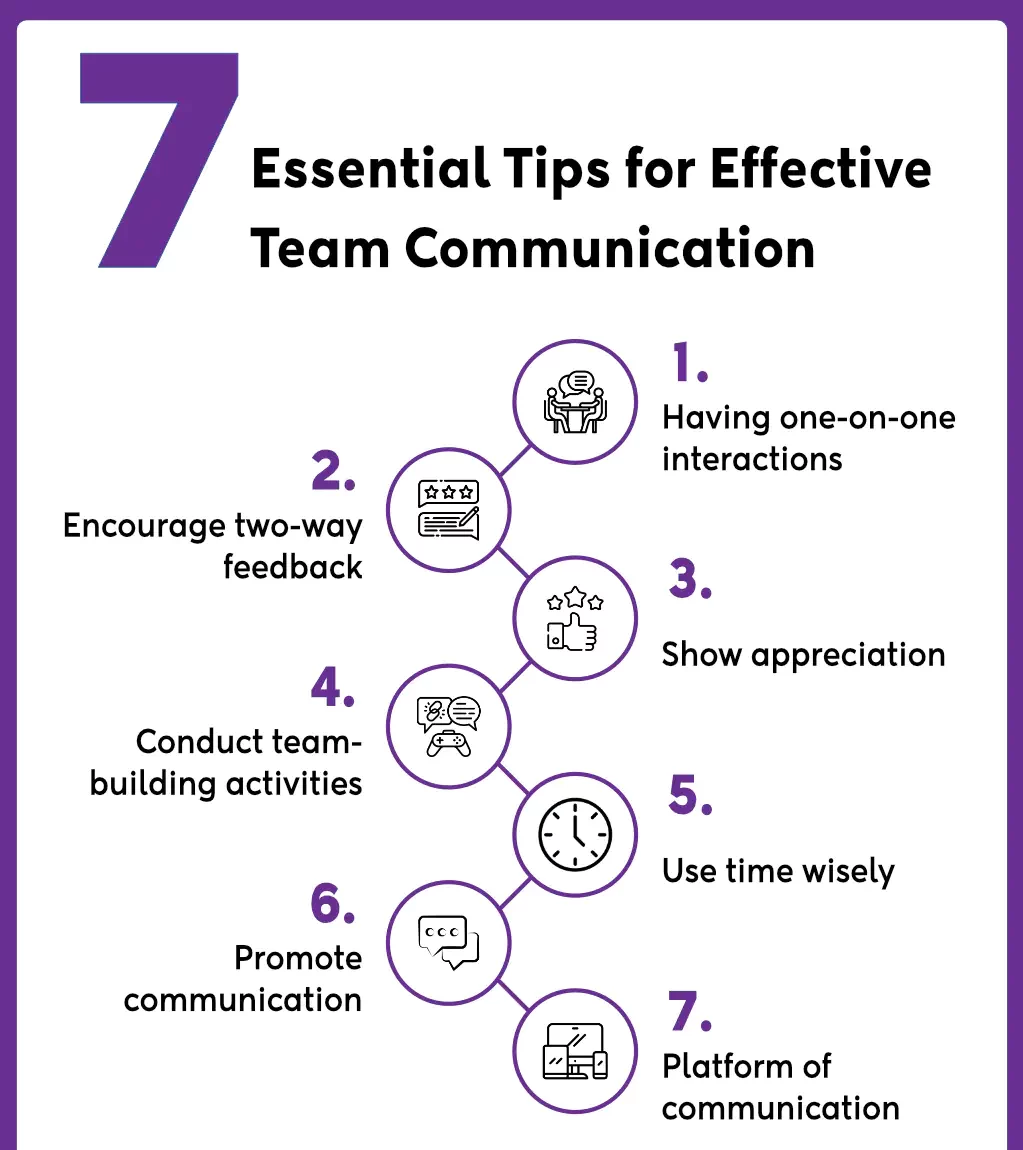
*proofhub.com
Communication is an essential part of effective team management. Without clarity and consistency, even the most capable team will not be able to perform well. Here are some easy tips to improve your team’s communication in 2025:
1. Constantly Communicate With Your Team
Effective teams communicate a lot – and not just about work. They talk about issues, progress, and ideas. Effective communication includes not only face-to-face meetings but also one-on-one meetings and quick communication via digital methods. For remote and hybrid teams, a program like Bordio can help communication by allowing team members to chat directly with each other in tasks, leave notes, and see all of the progress of the project in one location.
2. Don't be Afraid to Ask Questions
Create a healthy culture where everyone is comfortable asking questions. Many times, team members avoid having clarification for fear of being judged, which can lead to an even heavier mistake down the line. If it is okay to ask a question, then you have a better chance of minimizing the error and also collaborating with the team to inform everyone.
Great leaders empower their teams: “There are no dumb questions, only missed opportunities for clarification.”
3. Hear Everyone
Listening is as important as talking. Involving everyone in the conversation makes team members feel valued. For example, Someone on the team may have an idea that significantly changes your direction, while another member may provide you insight as to problems you would not have known existed if you did not listen.
4. Have fun Teambuilding
Wondering how to manage a team? Communication works best when the team feels comfortable with each other. Plan fun and engaging team-building opportunities, regardless of how small – office games, retreats, and occasional rituals (e.g., coffee catch-ups) are easy and fun ways to help team members engage and build relationships.
Team Management Tips on Hiring
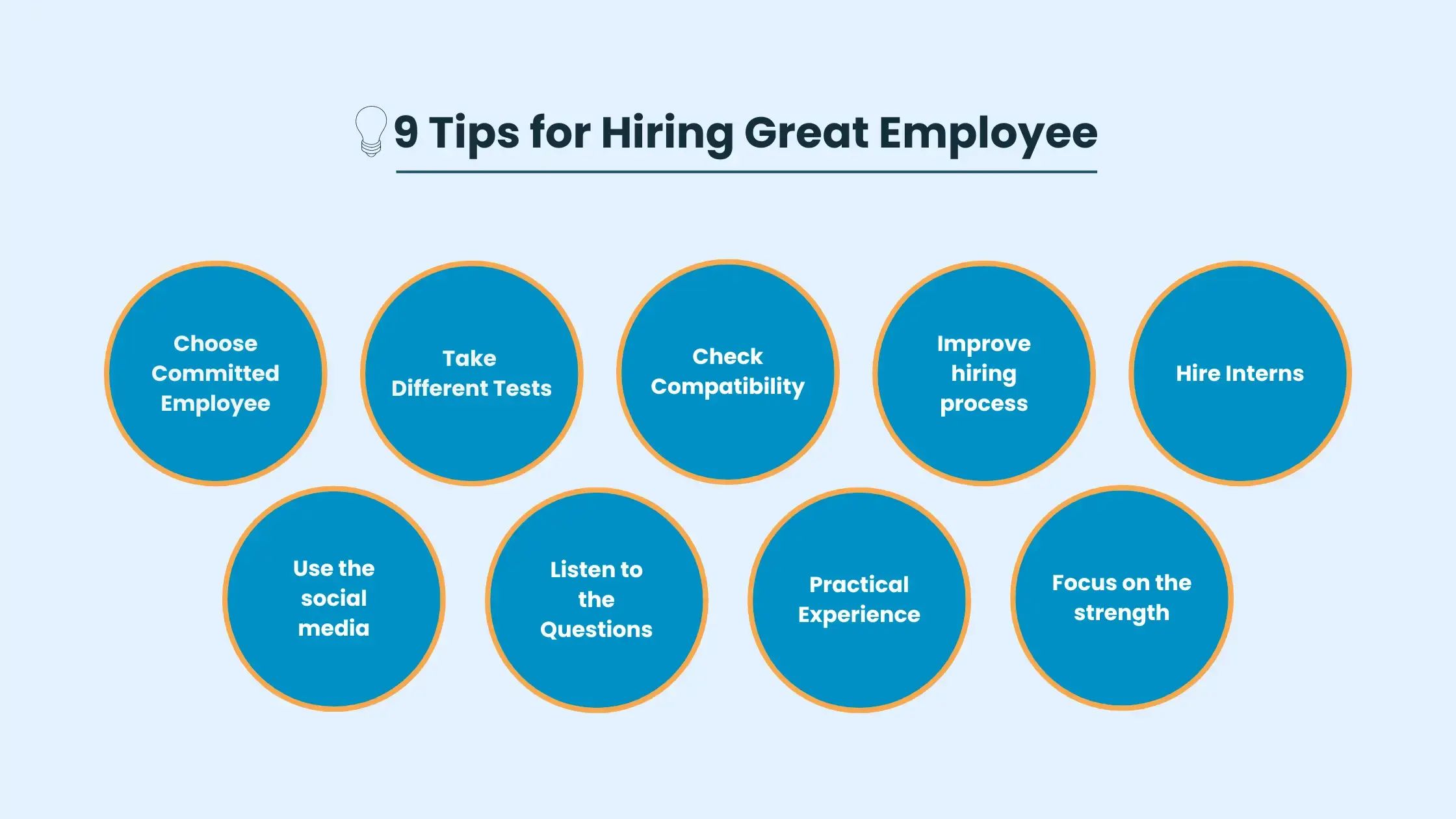
*ismartrecruit.com
A team is built by the right people. So, hiring employees and forming your team is an important part of team management. Let’s look at some essential tips mainly focused on this aspect:
5. Write a Good Ad
Having a clear and exciting job advertisement will attract candidates who are aligned with your company culture. Be specific about the functions of the role, company values and benefits. It is important that candidates read about your company in the language spoken by your team, rather than copying and pasting from existing job templates.
6. Find the Right People
Team management starts with hiring beyond just the skill set. Look for adaptability, problem-solving and a good teammate. You actually want someone who is aligned with your goals and values. During an interview, be sure to be prepared to ask potential candidates a situationally based question to show how they may interact with your existing team.
7. Think About Working with your Team and Team Compatibility
A candidate can be smart and well-qualified, but if they do not fit into the team in terms of attitude and personality, the fit may not be ideal. If you can include some of your team in the hiring process, perhaps in the form of a peer interview or some kind of brief group exercise with the candidate, then they may be in a better position to determine if this is a good fit.
8. Minimise Employee Turnover
Minimising employee turnover is one of the important team management skills. The goal is to be visible in terms of recognition, reward, and opportunity. Employee turnover normally increases when employees feel unappreciated or when employees feel their work is stagnating. So, show them career paths, view ongoing training, etc.
Tips for Managers on Managing Teams Productively
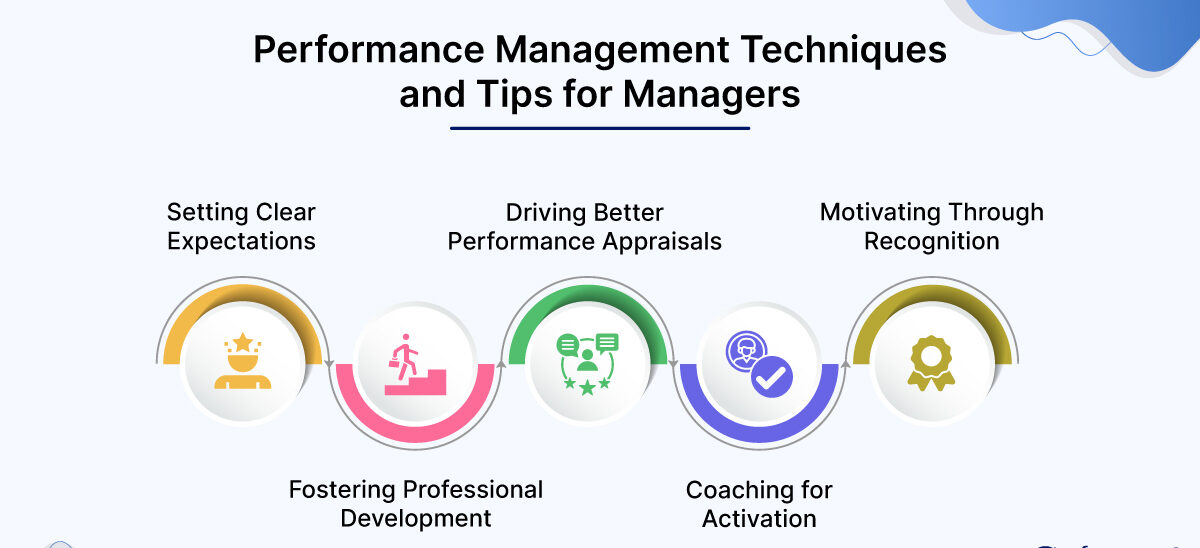
*softwaresuggest.com
Productivity is the lifeblood of any team, though balance is key. You don’t want to push the limits, as burnout leads to productivity losses. You don’t want to micromanage, which creates inefficiency as well. So, what to do? Follow these quick tips:
9. Use Apps and Tools to Manage Your Team
In contemporary workplaces, technology tools are integral to running a company. Some of the project management platforms like Trello, Zoho, Jira, and Basecamp allows you to create and assign tasks, deadlines, and monitor their work, time, and efficiency. These tools will help ensure that you do not miss any detail, and allow teams to create content together and remotely.
10. Use Delegation Properly
Delegation should not be seen as a task that you are handing off to someone – it is a team member taking ownership of a new responsibility that fits their level of skill and capacity. For great team management, review the skills of each team member, delegate their tasks, and trust your people. Empowering a team member in this way creates empowerment and therefore increases productivity.
11. Promote Teamwork
Teamwork creates a culture of innovation. Regularly, conduct collective brainstorming sessions, facilitate mutual spaces for the exchange of ideas, and reward teamwork and collaboration. When individuals work with others, they can leverage each other’s strengths, creating a more innovative work product.
Tips on Team Management at the Strategic Leve
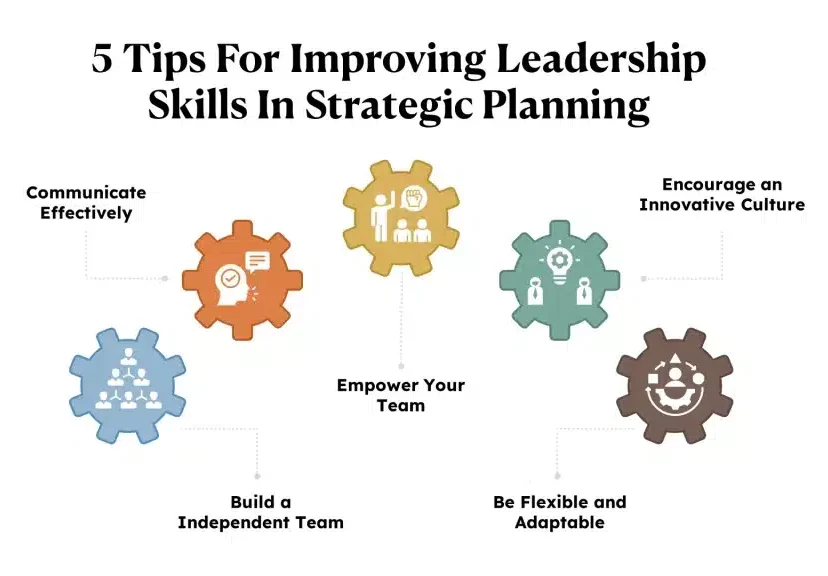
*kapable.club
Good leaders lead from a strategy of clarity that aligns the team with the mission of the organisation. So, here are some of the most important tips:
12. Stay Focused on Goals
Every company’s goal also has a well-defined objective that the whole team can rally around. So, breaking out major objectives into smaller milestones with celebrations along the way is a good system or substitute that uses good objectives as “big milestones.” Goals and objectives are a “compass” that ensures everyone is on course.
13. Be Clear about What is Expected
Being clear is another essential team management skill. So, do not be vague in your instructions. Knowing is only half the battle. Be clear with the team about their role, responsibilities, and deliverables. This is because clarity might save a little frustration and prevent wasted effort.
14. Set a Mission
All teams should have an engine for a mission statement that allows them to connect to the overall bigger mission of the company. This shows a “why” behind the work & creates a collective focus beyond the work the team delivers.
15. Know Who is Accountable for What
Accountability of people is important. To minimize confusion, hold your team accountable to the point of accountability. What is the emphasis of the business, and to whom does it lie? Of accountability. When it establishes roles, deliverables, and responsibilities, it allows individuals to more easily hold each other accountable.
16. Avoid Burnout
Burnout is tangible. So, these team management skills are sensitive to fostering fatigue, avoiding endless pressure, and cultivating a healthy work-life balance. As you know, the most productive teams are well-rested teams—not overworked teams.
17. Value Time
In time, teams may need time-blocking, “level down,” and limit unnecessary meetings. The right team management starts where a leader understands that time is the most valuable thing you have, so treat it carefully.
18. Promote Discussion, Not Conflict
Wondering how to manage conflict in a team? Well, it starts with a healthy discussion that can invoke creativity. Advocate for discussions but set boundaries so discussions do not become conflicts.
19. Take Care of Team Issues Immediately
Do not let small conflicts lead to significant issues. Malaise, upset, etc., can be made worse if not addressed immediately. Be a mediator when necessary and restore harmony if possible.
20. Be Organised
Productivity depends on organization. Be on top of your workflows, create a centralized location for documentation, and use tools like Bordio to keep track of your team’s tasks and deadlines.
21. Support Your Team
Celebrate success, no matter how small. Celebrate wins as recognition can foster morale and loyalty.
Team Management Tips on Motivation
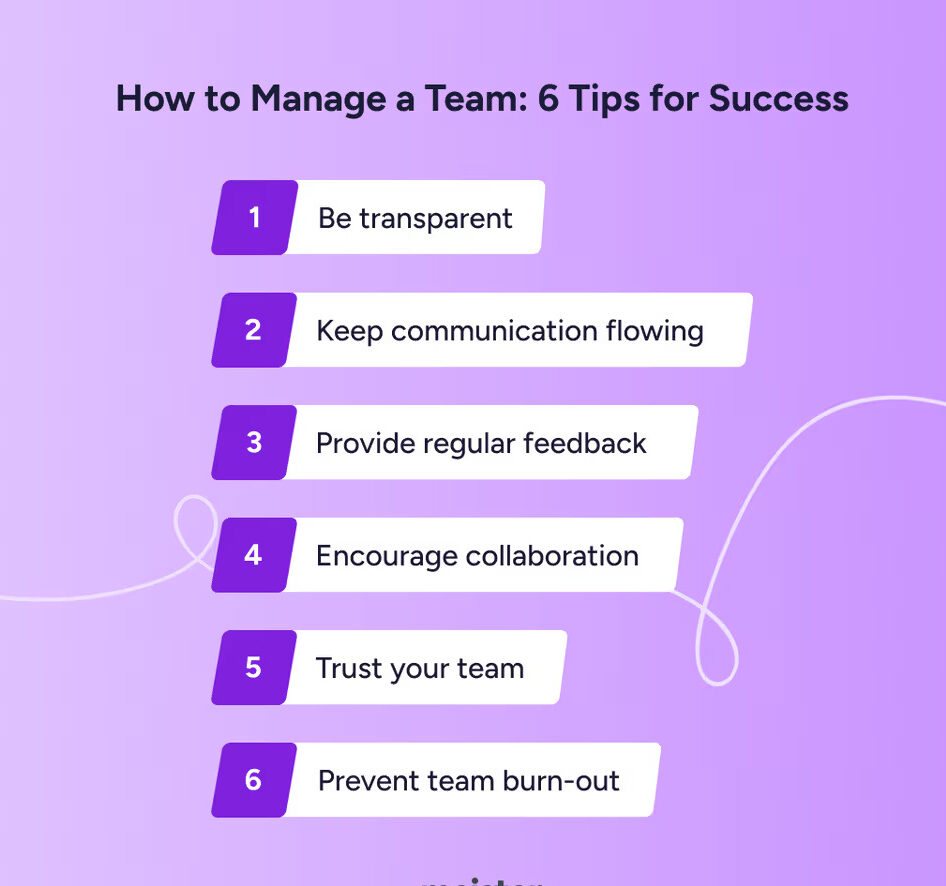
*meistertask.com
A motivated team is an unstoppable team. Motivation is generally a combination of empathy, recognition, and growth opportunities.
22. Be Empathic
Understand what your team member might be dealing with, and show them you care. Empathy helps establish loyalty and helps build a connection.
23. Create an Environment of Respect
For team management, remember that respect builds trust. Promote inclusiveness and appreciate individual contributions. A respectful workplace creates psychological safety.
24. Be Honest and Balanced
Transparency and fairness create trust in leadership. Honest communication, when performed skillfully, discourages rumors and maximizes morale.
25. Establish Clear Rules
Rules create structure and consistency. Clearly mentioned expectations create uniformity of purpose and reduce potential for confusion and conflict.
26. Give Team Members Space to Develop
Effective team management is all about creating opportunities for training, mentorship, and promotion. Development keeps employees involved and engaged.
27. Establish Realistic Goals
Ambitious but realistic goals keep motivation high. Unreasonable, impossible goals create frustration instead of success.
28. Utilise Knowledge and Skills
Encourage knowledge-sharing sessions where team members can learn their own and others’ skills. Collaborating allows the team to maximize everyone’s strengths.
29. Be Open about Decision Making
Being open is the most essential team management skills required in today’s workplace. Share the reasons behind decisions. Openness builds trust and keeps team members engaged. It also encourages feedback, making the process more collaborative and effective.
30. Build Connections
Make an effort to learn about your team’s personal lives. Stronger ties lead to loyalty and teamwork. These personal connections create a sense of belonging and reduce workplace stress.
31. Recognise and Reward Work
Recognise outstanding achievement and be specific; public recognition is best. Recognition raises morale and fosters consistency. Celebrating even small wins motivates employees to strive for bigger accomplishments.
32. Invest in Professional Development
This is another important team management skill. Provide opportunities to upskill, pursue certifications and/or attend leadership development programs. Employees who feel you invest in them stay longer and continue to engage.
33. Prioritise Results over Micromanagement
Do not focus on how many hours an employee works or where they are working: instead, focus on the result. Allow everyone inside your team to decide how they will reach their goals. This reduces friction and builds trust.
34. Establish transparency in decision-making
When you (and the team’s leadership) make decisions, regardless of how difficult they might be, share the rationale and trade-offs that went into your decision-making process. Invite input from your team where it alleviates discomfort. Leaders mitigate “top-down surprises,” while building buy-in.
35. Be Clear About Work Boundaries
Boundaries matter, especially in a remote/hybrid workspace. The leadership team needs to clarify “office norms”: how people are expected to work (for example, hours, how long one needs to respond to messages, and when they will not engage with technology for a few hours). This goes a long way in preserving well-being and efficient workplaces.
36. Continuously Give and Take Feedback
Do not wait for formal performance reviews to provide feedback. Offer weekly, ongoing positive and constructive feedback to your team. Ask, and/or create a culture of feedback for non-verbal feedback on your leadership. Feedback increases trust in your leadership and supports your growth as a leader.
37. Show What You are Expecting
If people need to be on time, to show transparency, to show empathy, and to be dedicated to work, then you need to show it. A person’s attitude is contagious and contributes to the work culture and climate.
38. Be the Most Proud Cheerleader for your Group
Be supportive of your team, especially during difficult times or challenges. Celebrate accomplishments, even the small ones. Speak to others about your team. Champions promote, defend, and back up their team. A leader who shows authentic champion for their team earns trust and longevity.
39. Encourage mentorship and support with task formalising
Encourage professional team members to work with new hires. A formal mentorship program provides a mechanism for knowledge transfer, confidence in development, builds leadership capacity, and gives employees an individual feeling of connection and growth.
40. Invest in training or skill development
Do not assume your team members know how to remain flexible and adaptable. Implementing regular training, workshops, or certifications allows you to challenge skills, ignite their thinking, and sustain morale. Training also shows you care about their long-term development.
41. Provide a Support System and an Environment
Ensure your team has the tools, think software functionality included, and not just the task environment, think attention, clarity, support systems, and well-being to best complete their work.
42. Encourage group socialisation
In addition to formal team building, plan more casual opportunities as well: coffee chats, virtual lunch rooms, or interest-based groups (book club, sports, etc.). Social bonds help collaboration.
43. Conduct team-building or social events
Plan retreats, offsite days or just fun social get-togethers. These build trust, break down silos and create personal connections that will strengthen the team.
44. Be open To Change and adapt
As you know, the workplace is changing at a rapid pace. So, as leaders, if you are not adaptable to these changes, you will definitely hold your team back. You can promote continuous improvement, flexibility, and timely reviews.
Wrapping Up
Keeping in mind that modern teams are increasingly distributed and diverse, using technology to collaborate across locations and time zones. This transformation is driven by the need for specialised skills. However, managing such vast teams brings challenges like maintaining clear communications, ensuring accountability, and coordinating time zones. So, follow the above-mentioned tips for effective team management and boost employee satisfaction, as well as make everything run smoothly.
And don’t forget, you can always rely on Jaro Education to build your career in Project Management. With a commitment to excellence, Jaro Education emphasizes practical learning, industry-relevant curriculum, and expert faculty to help students advance their careers. Our programs often include collaboration with reputed universities and organizations, ensuring that students receive a recognised and valuable education. Visit us to explore our online degree courses and programmes.
Frequently Asked Questions
What are the 4 steps to team building?
The four steps to effective team management and building are forming, storming, norming, and performing.
What are the 4 elements needed for effective teamwork?
Four key components must be present for a team to be effective: Goals, Roles, Interpersonal relationships, and Processes.
What is team management and why is it important?
Team management is the ability to organize, coordinate, and guide a group of people to achieve common goals effectively.
How do you manage conflict in a team effectively?
To manage conflict in a team, address issues early, listen to all sides with empathy, and focus on finding a solution that benefits the group.

















